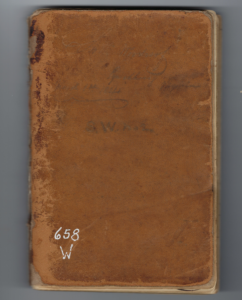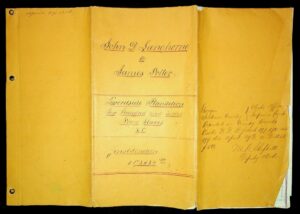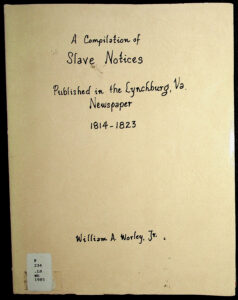Jones Memorial Library holds materials in the collection that name and enumerate enslaved persons who lived in Lynchburg and surrounding areas.
In 2023, the Library began a systematic effort to make these materials more accessible through digitization, transcription, and publication. Listed here are resources from our collection that relate to enslavement and enslaved persons in the area.
Researchers are also encouraged to check with other area organizations for additional materials.
Seth Woodroof Account Book and Dataset

Seth Woodroof was a Lynchburg slave trader. Jones Memorial Library holds an account book which belonged to Woodroof.
Manuscript 1047: The Seth Woodroof Account Book names and enumerates more than 200 enslaved persons in the city for the period 1834-1840. The book has been fully digitized and a dataset is published with Enslaved.org.
In 2024, the Seth Woodroof Account Book was named a Virginia Top Ten Endangered Artifact by the Virginia Association of Museums.
Link to Seth Woodroof Account Book in our digital collection
Link to Enslaved.org dataset and article
Projects in Progress

Jones Memorial Library holds a collection of documents known as Manuscript Collection 1140: The Potter Estate Papers.
John Potter was a plantation owner who consolidated multiple parcels of rice farming land along the Savannah River in Chatham County, Georgia in the early 1800s to form the Colerain and Tweedside Plantations. Several hundred people were enslaved on the Potter plantations, including Thomas Sims and his mother Minda Campbell.
In 2024, the Library has been digitizing, transcribing, and enumerating the enslaved persons named in this collection. A dataset and article is in process for publication with Enslaved.org.

In 2025, the Library has been digitizing, transcribing, and creating datasets for three manuscript collections and one unpublished work. We anticipate publication of these datasets in mid-2025 with Enslaved.org.
The Blackford Family Collection lists individuals enslaved in Lynchburg in the 1800s.
The Garland Family Papers include the will of Samuel Garland, which names enslaved individuals living in the area.
The John C. Noell Papers include receipts for transactions involving the sale of enslaved persons.
A Compilation of Slave Notices by William A. Worley, Jr. names more than 500 enslaved persons listed in the Lynchburg, Virginia papers in the 1800s. Worley compiled the index in the 1980s and the Library has been converting the index into a searchable dataset.
Manuscript Collections under Review

Jones Memorial Library holds additional materials that name and enumerate enslaved persons. Use our catalog to search for items in print format.
We are in the process of evaluating our manuscript collections for resources to digitize, transcribe, and extract biographical information.
Researchers can use the top search functions on our Omeka-S digital collections site to locate materials and Finding Aids to collections that are keyword tagged as including information on enslaved persons and enslavement. Resources include inventories, lists, bills of sale, and plantation & farm records.
Manuscripts that have not been digitized yet are open to researchers for in-person use in our Reading Room.
Jones Memorial Library preferences use of the keyword terms “enslavement” and “enslaved person”. However, many materials are described using terms “slavery” and “slave”, particularly with printed and published materials written in the 1900s. We suggest that researchers employ a variety of keyword terms when searching for materials. Researchers are encouraged to contact the Library with concerns about terminology as relates to specific materials or collections so that we may more quickly repair these descriptions.
Recommended Links
The following cultural heritage institutions are also engaged with research on enslavement in the city and region:
Silent Witnesses (collaborative public history project of the Legacy Museum of African American History and the Lynchburg Museum System)
Legacy Museum of African American History
Library of Virginia guide to Lynchburg Free Negro and Slave Records
Point of Honor (former plantation)
Old City Cemetery (burial place)
Thomas Jefferson’s Poplar Forest (former plantation)
Patrick Henry’s Red Hill (former plantation)
Avoca Museum manumission project (former plantation)
Sweet Briar College community cabin (former plantation)
Burroughs tobacco plantation (former plantation)